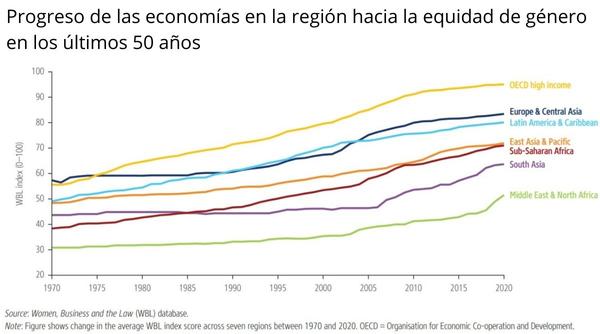16
07/2022
Countries continue to advance - slowly - towards greater equity in all social spheres, but the new challenge for women is to face laws and regulations that limit their economic opportunities, especially in the face of the new challenges caused by the pandemic of the pandemic ofCOVID-19 regarding health, safety, and economic protection.
Business women, who were already at a disadvantage before pandemic, now face a series of reforms to combat the economic impact of the crisis are limited in many countries and leave their needs out.On average, women have only three quarters of the rights recognized to men.
This information follows from the report 'Woman, Business and the Law 2021 ′ of the World Bank, which measures the laws and regulations in eight areas that affect the economic opportunities of women in 190 countries within a period that goes since September 2019As of October 2020.
“Despite the advances in many countries, we have found worrying setbacks in some of them, as limits to the freedom of movement of women without the permission of a male tutor.Pandemia has accentuated the existing differences that put girls and women at a disadvantage, particularly in the form of obstacles to schooling and job maintenance, added David Malpass, president of the World Bank Group.
Among the main positive findings towards the path of gender equity, the report indicates that many governments have adopted measures to address the impact of pandemic on working women.

For example, before the pandemic less than a quarter of the economies guaranteed by law the worker parents any license for the care of the children.However, since the impact of pandemic and forced confinement that involved the closure of schools, about 40 economies worldwide have established policies on social licenses or benefits in order to help parents in children careand divide the load equitably.
Even so, these measures are likely to be insufficient to address the challenges that many working mothers already face, and the crisis of children's care services.
Likewise, the Social Report of the Economic Commission for Latin America and the Caribbean (ECLAC), coincides with the findings of the World Bank and ensures that historically in the policies of reactivation of the crises, sectors such as mining, construction and construction have been prioritizedExploitation of natural resources, which have high levels of male participation.
@Artiequitter I Got My Tickets From Groupon and Have Don't Know How To Contact Rickie.Saw You 3x Already, Foward to the 4th looking.#fire
— Roger Humberson Wed Oct 18 02:01:43 +0000 2017
In addition, the ECLAC report also added data on the difficulty of accessing households and companies to the financial sector, highlights that women have less access to financial products and services, obtain smaller amounts in credits and other financial products thanThey request, and pay higher interest rates, although they are systematically better payers than men.
“It is essential to guarantee women's access, not only in their individual condition, but also as entrepreneurs.The measures taken should not be based on stereotypes in terms of risk assessment, credit history, the requirement of guarantees and guarantees, ”added the ECLAC report.
On the other hand, the World Bank said that despite the pandemic, 27 economies in all regions promulgated reforms in all areas analyzed and increased good legislation practices in 45 cases during the year covered by the study.Most reforms introduced or amended laws that affect the areas of remuneration and parentality.
In parentality they refer to the abilities and skills that parents put into practice to assure their children support, affection, education, socialization and protection.
However, parentality is the area that leaves a greater margin of improvement worldwide.This includes the remunerated parental license, the administration of the benefits for the government and the prohibition of the dismissal of women.
These reforms are necessary to overcome the restrictions faced by women in terms of types of work, tasks and schedules in which they can perform, which segregates them with less paid jobs.Also, in 100 economies the laws do not require equal remuneration for men and women for a job of equal value.
Both reports conclude that the pending road to overcome is broad but requires efforts and initiatives in governments, civil society and international organizations, among others.Legal and regulatory reforms can serve as an important catalyst to improve the lives of women, their families and communities.

- 704
- A catalyst in women's health
Related Articles
How many sit-ups should I do a day to get rid of my belly?
30/01/2022Flattening the abdomen or reducing the fat in this area is a difficult task. But don't despair, we will solve the question: how many sit-ups should I do a day to eliminate the belly. Abdominal fat...
Jalisco The Ministry of Health invites men and women to learn about family planning services
04/02/2022The Jalisco Ministry of Health invites men and women of reproductive age to learn about and use the various services offered by the Family Planning and Contraception Program, which...
Telva International day against gender violence: screens multiply mistreatment against women
01/02/2022SaludUpdated Change of scenery, same victims. On the International Day for the Elimination of Violence against Women, we highlight how aggressions have been copied to the digital sphere, increasing...
Coronavirus Spain today | | Health The Trust Project
18/03/2022The Ministry of Health has reported 3,261 new coronavirus infections and 155 deaths, while the cumulative incidence drops more than six points in 24 hours to 109.3 cases. There is...